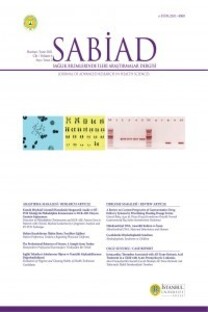Risk Toplumdan Kriz Toplumuna: COVID-19 Salgınının Gündelik Hayatımıza Etkisi
Son birkaç yüzyıldır bilimsel ve endüstriyel alanda meydana gelen devrim niteliğindeki değişmelerin yol açabileceği riskler uzun zamandan beri öngörülüyordu. Heidegger, Beck ve Giddens gibi düşünürler, bu değişim ve dönüşümleri bir yandan toplumun “yeni bir modernliğe doğru” geçişi olarak yorumlarken, diğer yandan da bunların sebep olabileceği türlü varoluşsal risklere vurgu yaparak “yeni modernliğin” başat niteliğini ortaya koymaya çalışmışlardır. İçinde bulunduğumuz zaman diliminde, dünya toplumları, bu varoluşsal risklerden biri olarak görülen COVID-19 salgınının bilfiil yaşandığı bir kriz sürecini tecrübe etmektedir. Bu çalışmada, ilk olarak “risk toplumunun” mahiyeti özellikle Beck’in kavramsallaştırmasıyla izah edilmeye çalışmış, ardından konuyla ilgili yapılan çalışmalara referansla günümüzde risk toplumu algısına ve bu algının evrenselliğine dikkat çekilmiştir. Son olarak, COVID-19 ile birlikte tecrübe edilen kriz toplumunun gündelik yaşam üzerindeki etkilerine dair bazı değerlendirmeler yapılmıştır.
Anahtar Kelimeler:
Risk Toplumu, Kriz Toplumu, COVID-19 Salgını, Gündelik, Hayat
From Risk Society to Crisis Society: Impact of COVID-19 Pandemic on our Lives
The risks posed by the revolutionary changes that have taken place in the scientific and industrial fields over the past few centuries have long been anticipated. Thinkers such as Heidegger, Beck, and Giddens interpreted these changes and transformations as society’s transition “towards a new modernity,” and revealed the dominant quality of the new modernity by emphasizing the various “existential risks” they may cause. Currently, the “world risk society” is going through a crisis process in which the COVID-19 epidemic, which is seen as one of these existential risks, is actually being experienced. This study aims first to understand the nature of the current crisis in the light of Beck’s theory of risk society, and second to assess today’s perception of risk society and the universality of this perception.
Keywords:
Risk Society, Crisis Society, COVID-19 Pandemic, Everyday Life,
___
- 1. Ataman K. Post-Hakikat Döneminde Din Hakkında Konuşmanın İmkânı Üzerine Mülahazalar. In: Turan İ, Sancar F, editors. Türkiye’de Yüksek Din Öğretimi: Kurumsallaşma-Sorunlar-Beklentiler. Samsun: Ondokuz Mayıs Üniversitesi Yayınları; 2019.s.45.
- 2. Beck U. Risk Society: Towards a New Modernity. Çev. M. Ritter. Londra: SAGE Publications; 1992.s.153-94.
- 3. Beck U. World at Risk: The New Task of Critical Theory. Development and Society 2008; 37(1):1- 21.
- 4. Beck U. Critical Theory of World Risk Society: A Cosmopolitan Vision. Constellations 2009;16(1):3-27.
- 5. Giddens A. The Consequences of Modernity. Standford: Standford University Press; 1990.s.1.
- 6. Giddens A. Modernity and Self-Identity: Self and Society in the Late Modern Age. Standford: Standford University Press; 1991.s.4. 7
- . Günerigök M. Risk Toplumu ve Din: Yeni Bir Sosyolojiye Doğru. Ankara: Maarif Mektepleri; 2018.
- 8. Heidegger M. Discourse on Thinking. Çev. J. M. Anderson ve E. H. Freund. New Yok: Harper Torchbooks; 1966. s.46-56.
- 9. Ritzer G. The McDonaldization of Society. Thousand Oaks, CA: Pine Forge Press;2004. s.167-201.
- 10. Wallerstein I. World-Systems Analysis: An Introduction. Durham: Duke University Press; 2004.s.12-84.
- 11. Welzer H. On the Rationality of Evil: An Interview with Zygmunt Bauman. Thesis Eleven 2002;70(1):100-12.
- Yayın Aralığı: Yılda 3 Sayı
- Başlangıç: 2018
- Yayıncı: İstanbul Üniversitesi
Sayıdaki Diğer Makaleler
COVID-19 Pandemisinin Mevcut Durumu ve Gelecek Öngörüleri
Covid-19 Pandemisinde Veteriner Hekimliği Etiği
Ayşenur DALDABAN BERBEROĞLU, Tuğba DOĞAN, İlhan İLKILIÇ
Covid-19 Bağlamında Zorunlu Aşı Tartışmalarının Hukuki Boyutu
Covıd-19 Pandemisinin Toplum Ağız Diş Sağlığına Etkileri ve Etik Sorunlar
Kadriye PEKER, Gülsüm AK, Özen ONUR, Sabire DEGER İŞLER, Mustafa Mert AÇIKGÖZ
Melek ESİN, Ayşe DOST, Nursel GÜLYENLİ
Sağlık Bilimlerinde Covid-19 ve Etik
Ayşenur DALDABAN BERBEROĞLU, Merve Nur KOÇAK ÖZTÜRK
Risk Toplumdan Kriz Toplumuna: COVID-19 Salgınının Gündelik Hayatımıza Etkisi
Covid-19 Pandemisinin Veteriner Hekimler ve Hayvanlar Üzerine Etkileri
